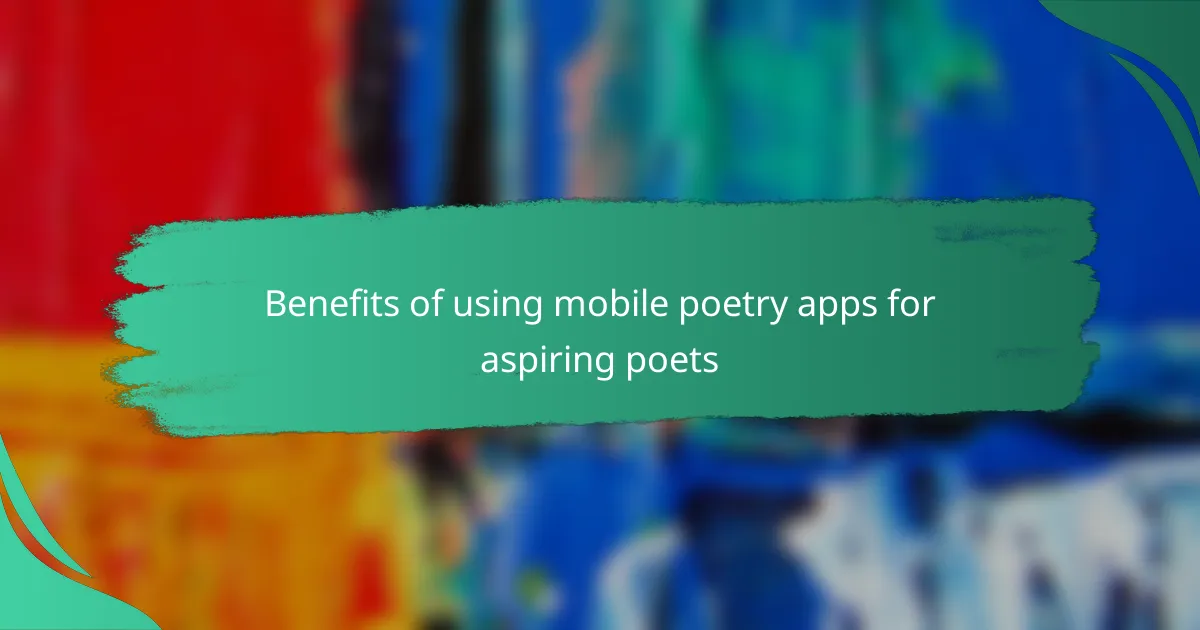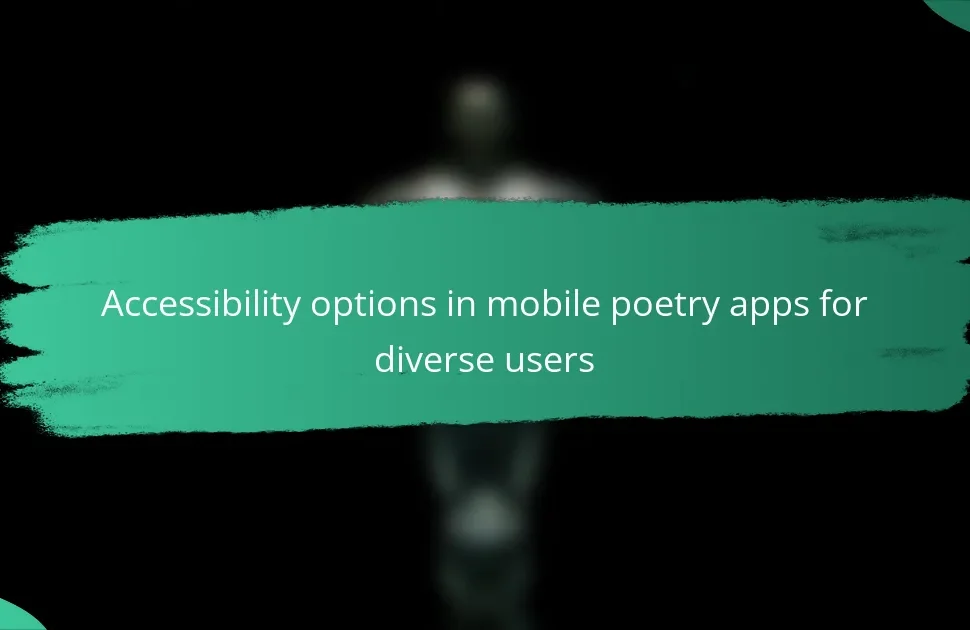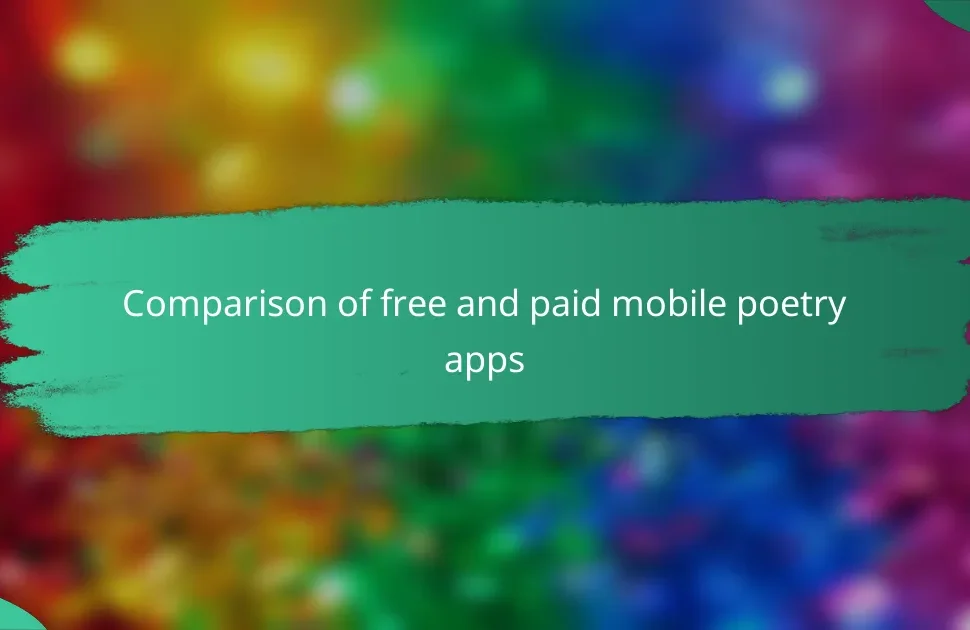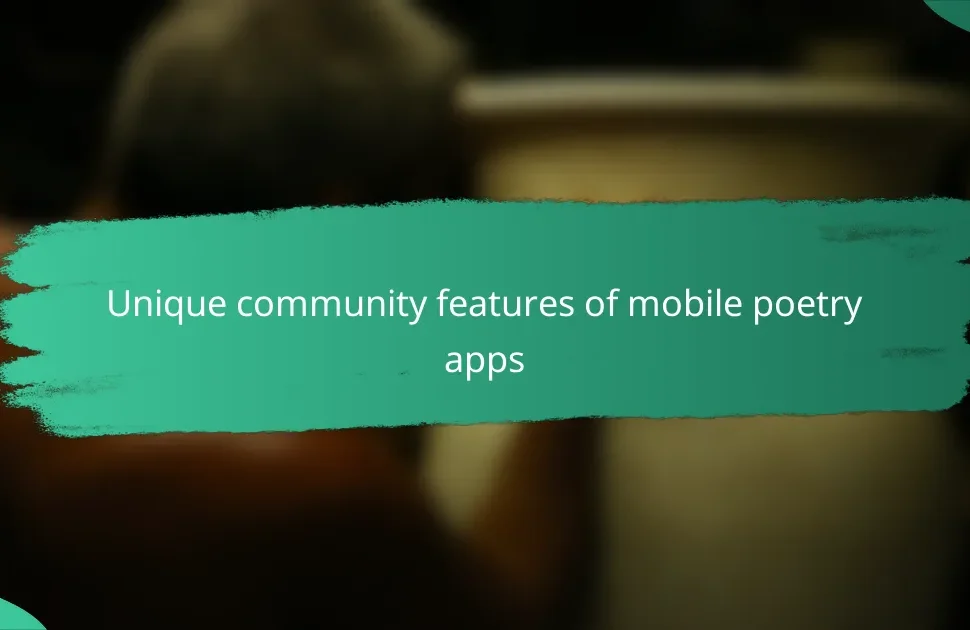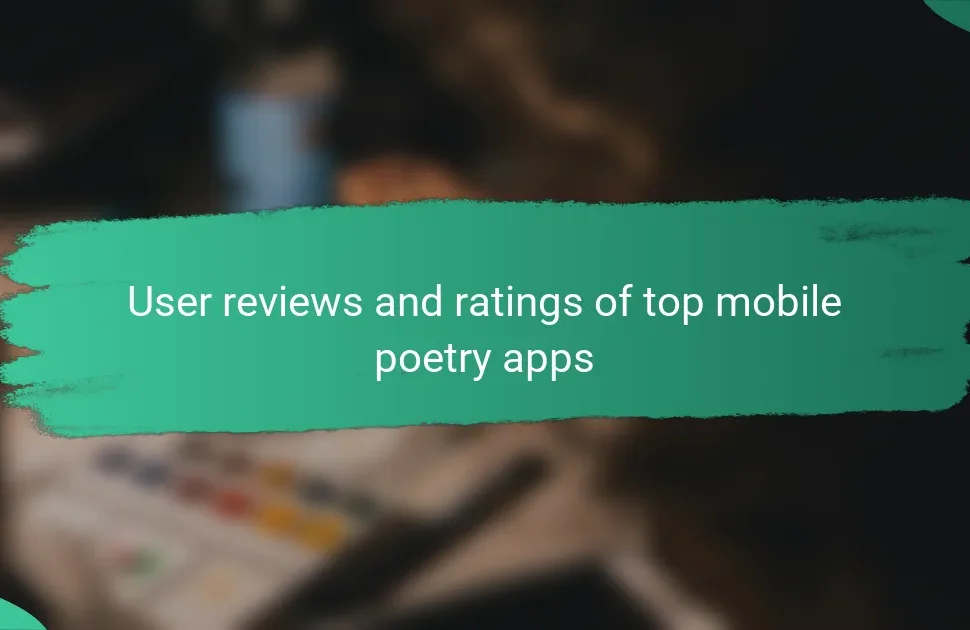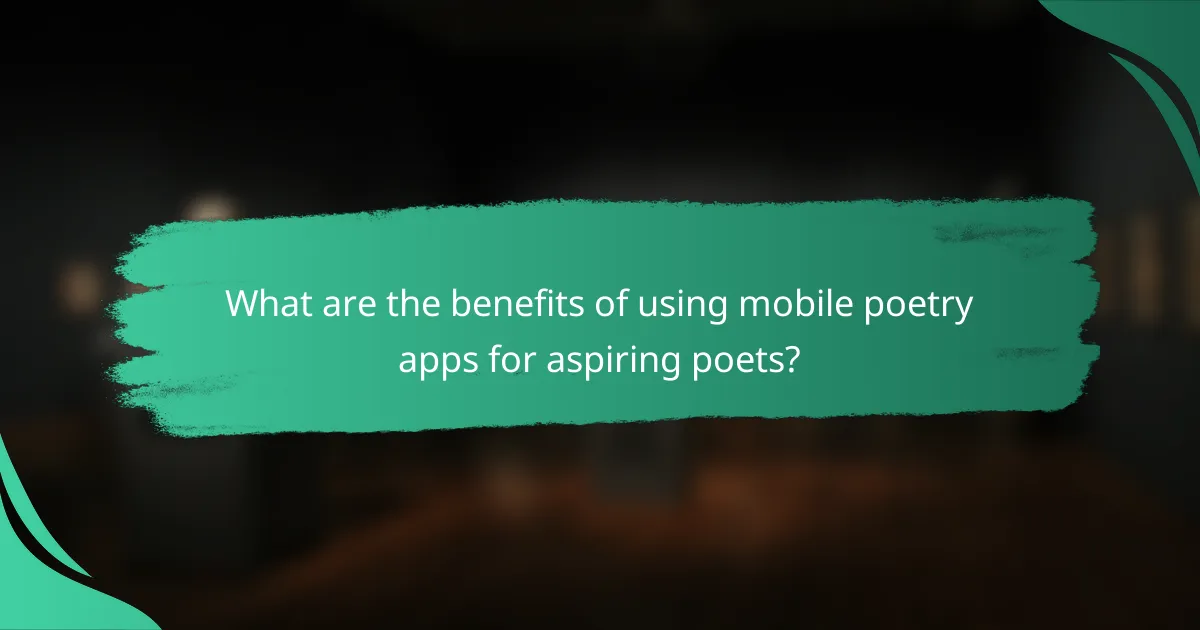
What are the benefits of using mobile poetry apps for aspiring poets?
Mobile poetry apps provide aspiring poets with numerous benefits. They offer a platform for easy access to writing tools. These apps often include features like rhyming dictionaries and thesauruses. Aspiring poets can also find prompts to inspire creativity. Many apps allow users to share their work with a community. This feedback can be invaluable for growth and improvement. Furthermore, mobile apps enable poets to write on-the-go, enhancing productivity. They often include options for organizing and saving poems for future reference. Overall, mobile poetry apps support the creative process and foster a sense of community among poets.
How do mobile poetry apps enhance the writing process for poets?
Mobile poetry apps enhance the writing process for poets by providing tools for creativity and organization. These apps often include features like rhyme generators and thesauruses. They facilitate quick note-taking for inspiration on the go. Many apps allow for easy editing and formatting of poems. Poets can share their work directly from the app, fostering community feedback. Some apps offer prompts to stimulate creativity. Analytics features can track writing habits and progress. Overall, these functionalities support a more efficient and engaging writing experience for poets.
What features do these apps provide to support creativity?
Mobile poetry apps provide features that enhance creativity for aspiring poets. These apps typically offer writing prompts to inspire new ideas. They include tools for organizing and structuring poems effectively. Many apps allow users to record their spoken word, capturing the rhythm and flow. Collaborative features enable poets to share and receive feedback on their work. Some apps provide access to a community of fellow poets for support and inspiration. Additionally, built-in dictionaries and thesauruses assist in word choice and vocabulary enhancement. Creative visualization tools help poets see their work in new ways. These features collectively foster a supportive environment for creative expression.
How can mobile poetry apps help in overcoming writer’s block?
Mobile poetry apps can help overcome writer’s block by providing prompts and inspiration. These apps often feature daily writing challenges that stimulate creativity. Users can access a community of poets for feedback and support. Many apps include tools for brainstorming and organizing ideas. This structured approach reduces the pressure to create from scratch. Additionally, some apps offer guided writing exercises that can spark new thoughts. The convenience of mobile access allows users to write anytime, anywhere. Research shows that engaging with writing prompts can significantly enhance creative output.
What role do mobile poetry apps play in community building for poets?
Mobile poetry apps play a significant role in community building for poets. They provide platforms for poets to share their work and receive feedback. These apps facilitate connections among poets, fostering collaboration and support. Many apps include features like forums and chat groups, enhancing interaction. Poets can participate in challenges and prompts, encouraging creativity and engagement. Mobile poetry apps often showcase local poetry events, promoting community involvement. They also enable poets to connect with a global audience, expanding their reach. This interconnectedness strengthens the poetry community and nurtures emerging talent.
How can aspiring poets connect with others through these apps?
Aspiring poets can connect with others through mobile poetry apps by participating in community features such as forums and discussion boards. These apps often provide platforms for sharing work and receiving feedback. Users can also follow and interact with fellow poets, fostering relationships and collaboration. Many apps host challenges and contests that encourage engagement among poets. Additionally, social media integration allows poets to share their work widely and connect with larger audiences. Such interactions can lead to networking opportunities and the formation of writing groups. Overall, these apps facilitate a vibrant community for aspiring poets to thrive and grow.
What opportunities for feedback and collaboration do these platforms offer?
Mobile poetry apps offer various opportunities for feedback and collaboration. Users can share their work with a community of poets. Many apps feature comment sections for peer reviews. This allows for constructive criticism and encouragement. Collaboration tools enable poets to co-create pieces with others. Some platforms host writing challenges to foster community engagement. Users can join groups based on interests or styles for targeted feedback. These interactions enhance learning and skill development. Overall, mobile poetry apps facilitate a supportive environment for aspiring poets.
How do mobile poetry apps facilitate learning and skill development?
Mobile poetry apps facilitate learning and skill development by providing interactive tools and resources. These apps offer features such as writing prompts, rhyme dictionaries, and feedback mechanisms. Users can practice their writing skills in a structured environment. Many apps include tutorials and workshops led by experienced poets. This allows aspiring poets to learn techniques and styles directly from professionals. Additionally, community features enable users to share their work and receive constructive criticism. Research indicates that interactive learning environments enhance skill acquisition. A study by the National Endowment for the Arts found that engaging with creative writing improves overall literacy skills. Therefore, mobile poetry apps are effective in fostering both learning and skill development for poets.
What resources and tools do these apps provide for improving poetic techniques?
Mobile poetry apps provide various resources and tools for improving poetic techniques. These apps often include writing prompts to inspire creativity. They may offer rhyme and meter checkers to enhance structural elements. Many apps feature community forums for peer feedback and collaboration. Some provide educational content on poetic forms and styles. Other tools include thesauruses and dictionaries for vocabulary enhancement. Users can access examples of famous poems for reference and inspiration. Additionally, some apps allow for audio recording to refine performance aspects of poetry. These features collectively support aspiring poets in developing their craft.
How can aspiring poets track their progress using these apps?
Aspiring poets can track their progress using mobile poetry apps by utilizing built-in features such as writing logs and analytics. These apps often provide tools to record daily writing activities, allowing poets to see their consistency over time. Many apps include metrics that show word counts, poem frequency, and writing duration. This data helps poets identify trends in their writing habits. Additionally, some apps offer feedback mechanisms, enabling users to receive critiques from peers. By engaging with these features, poets can set goals and monitor their improvement. Tracking progress in this way fosters accountability and encourages ongoing development in their craft.
What are the potential drawbacks of using mobile poetry apps?
Mobile poetry apps have several potential drawbacks. One major issue is the distraction they can cause. Notifications and social media integration may interrupt the creative process. Another drawback is the limited screen space, which can hinder the writing experience. This may lead to difficulties in formatting and visualizing the poem. Additionally, the reliance on technology may reduce the tactile experience of writing. Some users may find that mobile apps lack the depth of traditional poetry tools. There may also be concerns over data privacy and ownership of written content. Lastly, not all apps provide comprehensive features for serious poets, limiting their utility.
How can distractions from mobile devices impact the writing experience?
Distractions from mobile devices can significantly hinder the writing experience. Notifications and alerts can interrupt a writer’s focus. This disruption can lead to decreased productivity and creativity. Research shows that multitasking can reduce writing quality by up to 40%. Frequent distractions can also increase the time taken to complete writing tasks. Writers may find it challenging to maintain a coherent flow of ideas. The constant temptation to check messages or social media can lead to fragmented thoughts. Overall, distractions from mobile devices negatively affect the depth and quality of writing.
What are the limitations of relying solely on mobile apps for poetry?
Relying solely on mobile apps for poetry has several limitations. First, mobile apps may lack the depth of traditional poetry resources. Many apps do not provide comprehensive literary analysis or historical context. Second, the user interface on mobile apps can hinder the immersive experience of reading poetry. Distractions from notifications and other applications can disrupt focus. Third, mobile apps often prioritize brevity over complexity. This can lead to simplified interpretations of nuanced poems. Fourth, reliance on apps may limit exposure to diverse poetic forms. Many users may miss out on print poetry collections or live readings. Lastly, mobile apps can restrict community engagement. In-person poetry readings foster connections that apps cannot replicate. These limitations highlight the need for a balanced approach to poetry consumption.
How can aspiring poets choose the right mobile poetry app for their needs?
Aspiring poets can choose the right mobile poetry app by assessing their specific needs. They should consider the app’s features, such as writing tools, editing capabilities, and community engagement. User reviews and ratings can provide insights into the app’s effectiveness. Additionally, exploring free trials or demo versions can help in evaluating usability. Compatibility with different devices is also crucial for seamless access. Finally, the app’s focus on poetry, like prompts or inspiration sources, can enhance the creative process.
What criteria should poets consider when selecting an app?
Poets should consider usability, features, and community when selecting an app. Usability ensures the app is user-friendly and accessible. Features like writing tools, prompts, and editing options enhance the creative process. A supportive community can provide feedback and encouragement. Compatibility with various devices is also important for flexibility. Additionally, poets should evaluate the app’s cost and subscription model. Reviews and ratings can offer insights into user experiences. Security and privacy policies are crucial for protecting original work.
How can users evaluate the effectiveness of different poetry apps?
Users can evaluate the effectiveness of different poetry apps by analyzing key features and user feedback. Key features include user interface, accessibility, and available tools for writing. Users should assess how intuitive the app is for creating and editing poetry. They can also look for features like rhyme suggestions, prompts, and community engagement options.
User feedback can be found in app store reviews and ratings. High ratings often indicate user satisfaction. Users should read both positive and negative reviews for balanced insights. Additionally, comparing the number of downloads can provide a sense of popularity.
Trial versions or free features allow users to test functionality before committing. Research shows that user experience significantly impacts app effectiveness, highlighting the importance of usability.
What are some best practices for maximizing the benefits of mobile poetry apps?
To maximize the benefits of mobile poetry apps, users should engage regularly with the app’s features. Consistent use fosters creativity and skill development. Participating in community forums within the app enhances learning through feedback. Utilizing prompts and challenges offered by the app can inspire new ideas. Saving and revisiting past works allows for reflection and improvement. Sharing poetry on social media can expand reach and gather diverse perspectives. Exploring different styles and forms within the app broadens creative horizons. Lastly, tracking progress through app analytics provides insight into personal growth as a poet.
How can poets integrate app usage into their daily writing routines?
Poets can integrate app usage into their daily writing routines by setting specific times for writing with apps. This creates a structured approach to their creativity. They can utilize features like prompts and word banks to inspire new ideas. Additionally, poets can track their progress using apps that log daily writing sessions. This helps maintain motivation and accountability. Many poetry apps offer community features for sharing work and receiving feedback. Engaging with this community can enhance their writing skills. Poets can also use apps for editing and revising their poems on-the-go. This flexibility allows for continuous improvement and refinement of their work.
What tips can help poets engage more meaningfully with features and communities?
Poets can engage more meaningfully with features and communities by actively participating in discussions. They should share their work regularly to receive feedback. Engaging with other poets’ work fosters a sense of community. Utilizing app features like prompts can spark creativity and collaboration. Joining groups or forums within the app enhances connection with like-minded individuals. Attending virtual events hosted by the app allows for networking opportunities. Following trends and popular topics can help poets stay relevant. Regular interaction with the community encourages support and motivation among peers.
Mobile poetry apps are digital platforms designed to support aspiring poets in their writing journey. These apps provide a range of benefits, including access to writing tools, community feedback, and organizational features that enhance creativity and productivity. Key functionalities include writing prompts, rhyme dictionaries, and collaborative opportunities, which collectively help poets overcome writer’s block and improve their skills. Additionally, these apps facilitate community building among poets, offering platforms for sharing work and connecting with others. However, potential drawbacks such as distractions and limitations of mobile interfaces are also discussed, along with best practices for maximizing the benefits of these applications.
